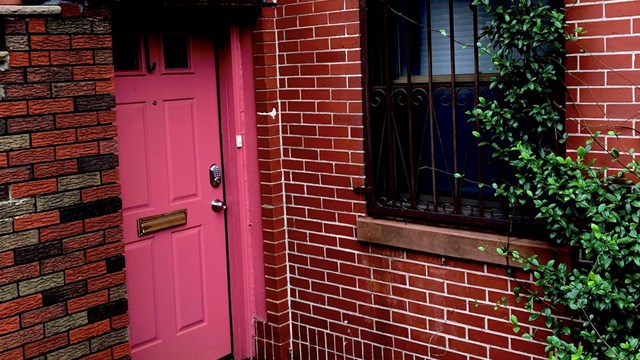Dana Greco, a therapist specializing in marriage counseling and divorce mediation lived in a comfortable two bedroom co-op on New York’s Upper West Side near Columbia University. Divorced herself and with grown children, her apartment was empty most of the day. She saw no reason not to see patients in her living room rather than rent shared therapist space at ever increasing monthly charges. Living on the ground floor next to the entrance doors, she would escort her patients into her apartment as soon as they buzzed the building front door. One day she received a letter from the managing agent instructing her that she was to cease and desist running her practice from her home.
According to U.S. Small Business Administration statistics, over half of all small businesses begun in the last decade have been home-based—that’s more than 38 million in real numbers—with a new home-based business being launched every 12 seconds. And according to U.S. Census figures, over 100,000 New Yorkers work from home, with more switching all the time. Home-based businesses (HBB) earn more than $427 billion per year.
New York City
Restrictions on home-based businesses vary from municipality to municipality and from state to state. In New York City, there are various restrictions already in place that apartment-dwellers must follow, from location to size and, of course, what type of business it is and what they can sell.
New York City’s zoning resolutions strictly prohibit advertising or public relations agencies, barber shops, beauty parlors, commercial stables or kennels, depilatory, electrolysis, or similar offices, interior decorators’ offices or workshops, ophthalmic dispensing, pharmacy, real estate or insurance offices, stockbrokers’ offices, and veterinary medicine and especially, daycare businesses, which would be unacceptable, primarily due to fire regulations. Additionally, regulations don’t permit any home business with multiple employees or that require numerous deliveries.
For example, according to the New York City Department of City Planning (DCP) zoning resolution, home businesses cannot sell articles produced off-premises. They can’t have outside signs or a display of goods that are visible from the outside. The business can’t store materials or products outside of a principal or accessory building or other structure or in certain districts, display a nameplate or other sign except as permitted in connection with the practice of a profession. According to the DCP, businesses cannot make external structural alterations which are not customary in residential buildings, or cause offensive noise, vibration, smoke, dust or other particulate matter, odorous matter, heat, humidity, glare, or other objectionable effects.
Chicagoland
Chicago’s regulations are quite similar. The ordinance does not permit direct sale of any product or display racks. Bulk deliveries must be limited to one per day and may occur only between 8:00 a.m. and 5:00 p.m. There are restrictions on the number of patrons that may be present at any one time and during a 24-hour period. No external or internal alterations or construction may be made that would change the residential character of the property and coops and condos may adopt rules prohibiting home-based businesses entirely without violating the ordinance. The list of prohibited uses is very similar to that outlined above for the New York City ordinance. Additionally, Chicago charges $250 for a home occupation license which must be renewed every two years.
Florida
Florida regulations are less stringent. Gloria Moreda, manager of the Land Development Coordination office in the Tampa, Florida zoning office, reported that, “home occupation is permitted in Tampa. It is referred to as special services and includes professional home offices, crafts and a one chair beauty salon.” That differs from the New York and Chicago ordinances, which don’t allow beauty salons or similar uses. She went on to say though that, “no equipment is permitted that would inconvenience neighbors. No employees other than family members and no more than 25% of floor area of a home or apartment may be used for the business. There can be no more foot traffic than is customary and no more than five customers a day by appointment only,” which mirrors the ordinances in New York and Chicago.
Miami-Dade County Zoning Code, Section 33-25.1 governs home occupation use in its jurisdiction. It is very similar to the Tampa ordinance in that it provides accommodation for single chair beauty salon use as well as typical ‘home office’ occupations. It also prohibits the effective operation of a retail store or a food concern. It does though permit more than one home office in a single residence as long as the total square footage dedicated to office use does not exceed 200 square feet. Special mention is also made for uses that enable persons with disabilities.
The Garden State
Regulations in New Jersey are harder to pin down as ordinances tend to be issued on the municipal level and there are hundreds of municipalities (565 to be exact) in New Jersey. A website at www.centraljersey.score.org, which provides public information for people interested in opening a business in central New Jersey, has a web page dedicated to home-based businesses. They advise potential home-based businesses to check with the regulations in their individual towns and communities and caution that in some communities starting a home-based business may bring you into contact with the county assessor. In some counties a tax is assessed on business furniture and equipment. They also point out that “many of the laws that apply to HBBs were enacted long ago and were meant to keep noisy, smelly, high-traffic activities out of residential neighborhoods. Yet today, they are being applied across the board to quiet computer consultants as well as the noisy, smelly businesses.”
New England
Accessory Home Occupation is treated by the Boston Zoning Code in much the same way as it is in other localities except to the extent that it “shall apply to Neighborhood Districts as established pursuant…to this code.” In simple terms it means that there be no outside employees, heavy equipment or sale of merchandise. As concerns condominiums there is a further consideration which is the governing condominium documents.
“Like many questions involving condominiums, the answer depends upon your condominium documents,” says attorney Henry Goodman, principal at the law firm of Goodman, Shapiro & Lombardi, LLC, with offices in Dedham, Massachusetts, Manchester, New Hampshire and Lincoln, Rhode Island. “Quite frequently, condominium documents provide that the units are solely for residential use. This will prohibit most commercial activities. Further, zoning bylaws applicable to the HOA may also prohibit commercial activities. It is to be noted that quite frequently a commercial activity that does not involve customer traffic or employees may be permitted, such as in the case of a “cottage industry,” home or professional office. A review of your condominium documents, zoning bylaws and court rulings would be in order to answer this question with any specificity.”
Like many other areas of the country, the presence of home-based businesses in a condo may be problematic. Despite dramatic changes in telecommuting technology, many associations, governed by condo bylaws drafted decades in the past, prohibit home-based business activity of any kind. “The first place to look,” says Mark Einhorn, an attorney and partner in the Braintree, Massachusetts-based law firm of Marcus, Errico, Emmer & Brooks, “is generally the declaration or the master deed, depending on which state you’re in. And there will be a section with restrictions on the use of units. Many of them say the use may only be for residential purposes.”
These out-of-date prohibitions, says Einhorn, may be a needlessly heavy-handed way of discouraging nuisance behavior. That, after all, is the real concern for most condo boards—not the businesses themselves. “I think sometimes boards go right to the ‘this will not be permitted’ and don’t attack what actually is the concern,” says Einhorn.
“The concern really isn’t the business being transacted in the unit; it’s the effect that activity could have on the association. So if you make a rule or do an amendment that permits a business to operate, but limits the activities that could potentially harm or interfere with the other residents, that would be my suggestion or that would be probably the better way to do it.”
What’s Allowed
So what businesses can be run from a co-op or condo unit? Personal consultancies—often computer based—such as writing or research are good examples, along with therapy and counseling services. Some buildings do permit residents to conduct sessions in their home, which brings us back to Ms. Greco. After she received the notice from the managing agent demanding, on the co-op’s behalf, that she cease and desist operating her therapy practice from her apartment she spoke to the manager. He told her that there were too many people loitering in the lobby waiting for appointments. It turns out the loiterers weren’t hers. Across the hall was a music teacher specializing in children. She booked back to back appointments from 3:00 p.m. on. Her students, mostly elementary school age, were accompanied to their lessons by their nannies and often their younger siblings. The nannies and the siblings waited in the lobby while she taught. The music teacher was ordered to stop giving lessons in her apartment. Greco was permitted to continue seeing her patients.
In co-ops, the subject of home-based offices is dealt with specifically in the proprietary lease. “Some allow for what is known as home occupation accessory use,” says Phyllis Weisberg, a co-op and condo attorney and a partner with the law firm of Montgomery, McCracken, Walker & Rhoads, LLP, which has offices in Pennsylvania, New York, New Jersey and Delaware. “An office use permitted in a residential building is limited with respect to square footage and employees. You must comply with the law,” she said.
Co-op and condo boards can choose to permit home office or home-based businesses but they must comply with the zoning for the site and district. They cannot independently change their leases to permit uses prohibited under the zoning. “If the use violates the law it may put the co-op in jeopardy. It could lead to violations on the building. Those violations could impact the ability of the building to do alterations through the Department of Buildings. But if you are in a district where the use or uses of these home-based businesses are permitted they could be treated differently. Buildings located in commercial districts, for instance. You have to make sure the use is permitted,” counseled Weisberg.
Rules can be quite restrictive. The fact remains that many people operate businesses such as electrolysis and hair styling from their apartments in co-ops and condos as well as rentals on a limited basis. Perhaps they see a few clients privately in the evening or on the weekends. In conversation with several managing agents they all freely admitted that more often than not in their co-op and condo buildings, it’s a matter of degrees and neighborliness. It often comes down to noise and foot traffic.
One who preferred to keep her identity private said, “I’m not suggesting that individual cooperators do or should break the law but it’s quite common. We had one situation where a yoga instructor took on a limited number of clients. The building was quite liberal about it as there was little to no noise and she spaced the appointments so no one was waiting in the lobby or hallways. It became a kind of ‘don’t ask, don’t tell’ situation.”
Proper Etiquette
Another consideration is whether the building has a doorman. The doorman is in the employ of the co-op or condo association. It is his responsibility to uphold the building rules and policies as much as to maintain security. It’s not a matter of tipping him or her to turn a blind eye.
Greco recently moved to another co-op in Riverdale in the Bronx, which has a doorman, unlike her previous building. These days she also lives on the top floor not the first floor. “I’m much more careful now,” she says. “I see a few clients on Tuesdays as I’ve developed a more comfortable relationship with the doorman on that evening. I space my clients out so that they’re not waiting in the lobby till the prior appointment leaves. I had one situation where a couple came for divorce mediation and it got quite ugly, lots of screaming. I now do an initial screening on Skype before I see anyone in my apartment. I don’t want any problems with the neighbors or the board.” She also mentioned that she had become active in the life of the co-op serving on various committees so that if there ever is a question she hopes her good will may sway her neighbors in her direction.
Larry Lubin, a licensed real estate salesperson with Klara Madlin Real Estate in Manhattan, says that buyers with home-based businesses should be upfront with boards when purchasing. “Boards don’t want high traffic in and out of the building. Some buildings are ‘live/work’ buildings to begin with and are better for people with those needs.” While he has never had a ‘turn down’ by a board for a purchaser with a home-based business, he recounted a situation where an associate lost a sale because the purchaser was a guitarist who taught students at home. “If you are already a cooperator in a building,” he added, “and are already conducting a business there, you are kind of grandfathered in. If the co-op changes the rules you will usually be permitted to continue but new purchasers will be subject to the new restrictions.”
Though there has been huge growth in home-based businesses over the past ten years it is still the prerogative of a co-op board or HOA to determine what types of activities they will permit on their premises and of course, these activities must dovetail with local ordinances governing commercial endeavors in residential buildings. Nevertheless and within legal confines, in co-ops and condos your success as a home-based business may often rest on your relationships with your neighbors, and their good will.
A.J. Sidransky is a novelist and a staff writer for The Cooperator and other publications.










Leave a Comment